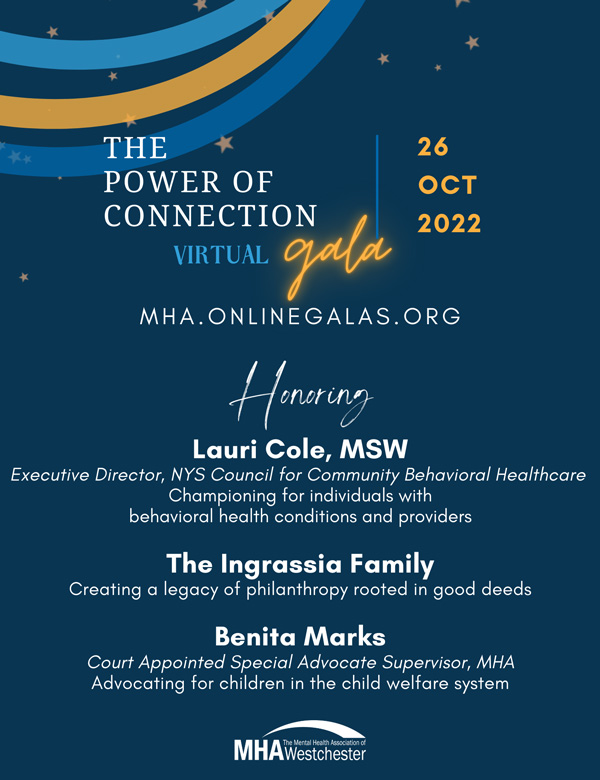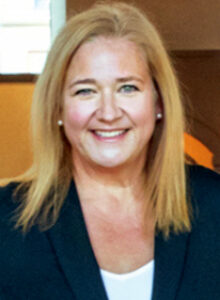Positive growth as a result of navigating challenges and building resilience is a basic tenet of the behavioral health care world. It’s the journey through which we support clients; it’s how clinicians and other staff flourish in their professions; and it’s how we, as organizations, adapt.

As agencies, change as a response to challenge enables us to address gaps in care that can be filled by innovative new services or ways of working. It also fuels us as we make improvements in service delivery and infrastructure, and ultimately, it is what helps us become stronger behavioral health care providers.
At The Mental Health Association of Rockland (MHAR) and The Mental Health Association of Westchester (MHAW), change is underpinned by our commitment to our clients. It is that promise – to identify and address the needs of our community while continually seeking to improve access to care – that has brought our two agencies closer than ever.
It is with great pleasure we share that The Mental Health Association of Rockland and The Mental Health Association of Westchester filed an intention to merge with the New York State Attorney General this summer. Building upon decades of working together in different capacities, our intention to merge organizations is a natural step in our evolution as two Mental Health America affiliates with nearly 150 years of combined experience.
Together, we have faced many of the challenges experienced in the mental health care sector. Together, we have emerged stronger and better positioned to care for our community as individual organizations. And together, we will create a united force in which we have more resources, talent, and experience to expand and improve our services to better support the greater New York region.
Our partnership spans decades and has only grown closer in the last 10 years. When we were faced with what we believed to be the largest transformation the Medicaid system has experienced – and all the challenges that we expected to come with it – we banded together with several other agencies to form a learning collaborative. United under the name of Coordinated Behavioral Health Services, our group recognized that by sharing resources, experiences, data, and ideas, each of our agencies would benefit – and so would our clients. We ultimately became a Behavioral Health Independent Practice Association or IPA.
Since its inception, the number of agencies involved in our IPA has grown and fluctuated as we addressed challenges such as leveraging value-based care contracts. We also recognized value in working with primary care partners. With a comprehensive approach to holistic, whole person care, we began working with Sun River Health, a Federally Qualified Health Center, to form an additional IPA, CBHCare. Through CBHCare, we formed the first, and for many years only, value-based contract for behavioral health services in all of New York with our business partners at MVP.
Throughout this time of transformation, our work has been enriched by working alongside agencies we admire, from whom we can learn, and those with values that mirror our belief in resilience, recovery, and respect.
It is through working with each other – and not in competition with each other – that we became certain of an emerging truth: we are stronger and better together.
MHAR and MHAW are individually successful as organizations, offering a menu of complementary supports and services. But together, we are better positioned to meet the many challenges we, and other similar organizations, face: building a stronger workforce; strengthening funding and infrastructure; creating opportunity to be more creative and innovative; and advocating for policy change.
By merging our workforces, we have the opportunity to build a deeper bench and utilize our resources optimally in order to better support staff. This has become imperative in recent years as the mental health needs of our communities have intensified, making the work more challenging. Creating a workplace culture that focuses even more strongly upon employee wellness, professional development, diversity, inclusion, and equity will now be a reality.
Upon approval and completion of our merger, our new entity is expected to be the second largest Mental Health America affiliate in the country. Our increase in size and scope will be advantageous – as it relates to serving a wider community with improved access to quality care as well as for advocating for regulatory reform with a stronger, louder voice. With greater financial sustainability also comes increased ability to compete on larger playing fields, potentially with for-profit organizations.
As a larger agency, we will also have access to opportunities that separately may not have been attainable, including pilot and demonstration projects, further expansion of CCBHC, and bundled payments for services with managed care organizations.
One such challenge we already share is advocating for the widespread implementation of regulatory reform. The ability to compete in today’s healthcare environment and provide care that is easily accessible, effective, and efficient requires flexibility that is not possible given the constraints of the regulations and limitations imposed on not-for-profit behavioral health providers. In order to offer new services that are integrated, modern, convenient, customer friendly and affordable, we need more competitive rates from commercial insurance and incentives for innovation and value to both clients and payors. For-profit providers must be held to the same standards as state-funded programs or those restrictions must be relaxed or eliminated for all. So much emphasis has been placed on policing not-for-profits that they have been forced to shift energy and resources from service delivery to chasing denial of reimbursement, compliance and maneuvering an ever increasingly complex set of regulations, billing requirements and data reporting that differ from program to program. Eliminating some redundancy and enjoying some economy of scale will help us to become nimbler and more efficient in these areas. As we expand our reach and size, we have a louder voice and stronger influence over how value can be measured and how policy is determined.
A challenge we experience as separate agencies and expect to continue navigating in the future as a merged entity, is better implementation of integrated care. Just as we break down the siloes between our organizations and work toward becoming one agency with a larger menu of supports and services, we remain hopeful that governing bodies, too, will reduce seemingly counterintuitive regulations amongst themselves in order to better serve the whole person.
We recognize the old adage that tells us we can’t be all things for all people. We also recognize that people need – and deserve – choices in their care. But we are certain we can be among the best at what we do, for those we serve – and that we are better together.
Stephanie Madison, LMSW, serves as President/Chief Executive Officer of The Mental Health Association of Rockland (MHAR). Charlotte Östman, LCSW-R, serves as Chief Executive Officer of The Mental Health Association of Westchester (MHAW). To learn more about MHAR, please visit mharockland.org or call (845) 267-2172. To learn more about MHAW, please visit mhawestchester.org or call (914) 345-5900.









